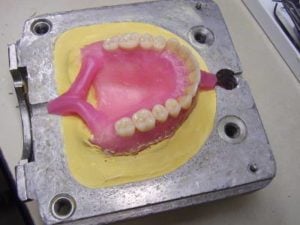What are they made out of?
 In
the past, the artificial teeth that make up dentures were made out of
porcelain or plastic, but more modern dentures are generally made out of
a hard resin. The materials used to make denture teeth are known to be
more fragile than natural teeth and can easily chip or crack if dropped
or otherwise uncared for. This material also wears down much quicker
than natural teeth and thus must be replaced with a new set of dentures
every five years or so.
In
the past, the artificial teeth that make up dentures were made out of
porcelain or plastic, but more modern dentures are generally made out of
a hard resin. The materials used to make denture teeth are known to be
more fragile than natural teeth and can easily chip or crack if dropped
or otherwise uncared for. This material also wears down much quicker
than natural teeth and thus must be replaced with a new set of dentures
every five years or so.Costs ? $3,000.00
The supporting structure of dentures that holds the artificial teeth in place and resembles the natural gum line is often made out of a similar resin used for the teeth, or a more flexible polymer material that fits snugly on the natural gum line.
Why wear dentures?
Dentures not only improve the appearance of a smile that has multiple missing teeth, but they also keep the structure of the mouth sound by supporting the structures around the cheeks and lips. Dentures also make it possible to eat foods that require chewing, making it possible to keep your diet the same and ensure that you are properly nourished. Lastly, dentures are a viable solution to replace teeth that are causing serious pain and oral health issues, such as those with rotted roots or severe damage. Having dentures fitted means that troublesome teeth are eliminated and replaced with a strong and beautiful alternative.How to clean dentures
Regardless of what kind of dentures you may have, all dentures need to be cleaned daily, just like regular teeth. Even though dentures are made up of artificial teeth, bacteria, plaque, and tartar still build up on them and can harm existing teeth and gums.To clean your dentures, take them out of your mouth and run clean water over them to dislodge any food particles that may be stuck between teeth, along the gum line, or underneath the structure. Then brush the dentures all over with a denture brush or very soft toothbrush using a mild soap or denture cleaner. Be sure not to use any other cleaners, regular toothpaste, or electric toothbrushes as these are all too abrasive and can damage and wear away the denture materials. After cleaning, make sure to rinse them well.
While your dentures are out of your mouth, be sure to clean your gums and any natural teeth with a very soft and wet toothbrush and fluoridated toothpaste if needed. If your toothbrush is too harsh, wrap your finger in a wet, soft washcloth and gently rub your gums, making sure to cover all surfaces.
Preserving your dentures
Always remove your dentures before sleeping to avoid damaging them, dislodging them, and to give your gums some time to relax. Submerge your dentures fully in warm, but not hot, water to keep them from drying out and becoming misshapen. Only use denture soaking solution if your dentures do not have metal components as the solution can tarnish the metal.More questions?
 If
you still aren’t sure whether or not dentures are right for you or if
you have other questions or concerns, talk to your dentist at your next
regular dental checkup to discuss the right path for you. If you are
looking for a dental professional who specializes in dentures and can
best address your specific needs, check out 123 Dentist and find a dentist in your area who’s a perfect fit for you.
If
you still aren’t sure whether or not dentures are right for you or if
you have other questions or concerns, talk to your dentist at your next
regular dental checkup to discuss the right path for you. If you are
looking for a dental professional who specializes in dentures and can
best address your specific needs, check out 123 Dentist and find a dentist in your area who’s a perfect fit for you.And remember, anyone could end up needing dentures! Hockey players, victims of automobile accidents, or people with genetic disorders may require an oral prosthetic of some sort, so the notion that it’s only for senior citizens is no longer accurate. If you or someone you know might need them, regardless of your age, don’t hesitate to inquire.


No comments:
Post a Comment